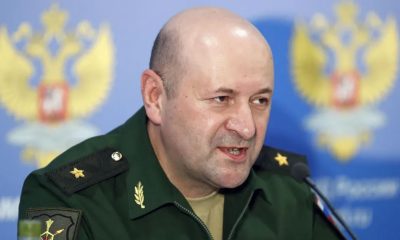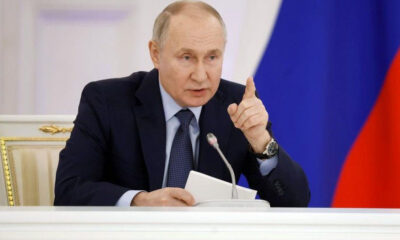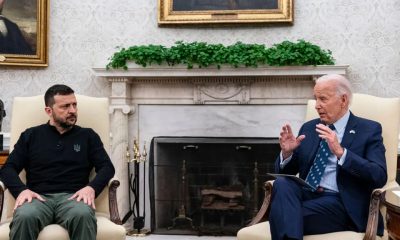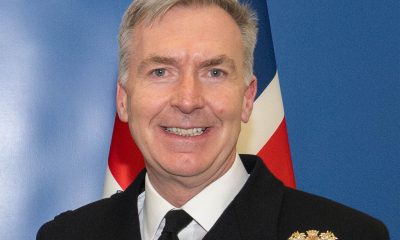International
U.S., allies plan for long-term isolation of Russia
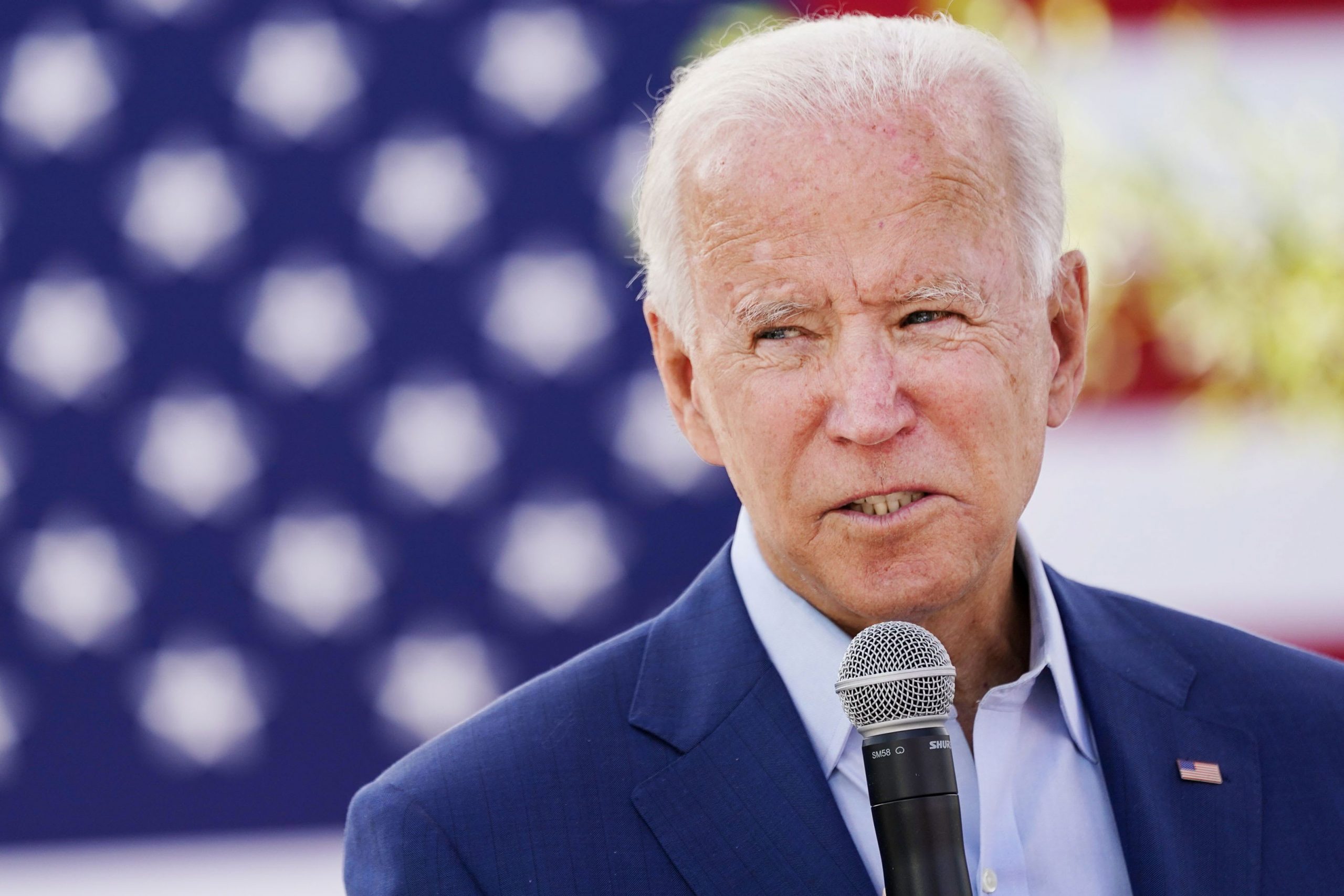
Nearly two months into Vladimir Putin’s brutal assault on Ukraine, the Biden administration and its European allies have begun planning for a far different world, in which they no longer try to coexist and cooperate with Russia, but actively seek to isolate and weaken it as a matter of long-term strategy.
At NATO and the European Union, and at the State Department, the Pentagon and allied ministries, blueprints are being drawn up to enshrine new policies across virtually every aspect of the West’s posture toward Moscow, from defense and finance to trade and international diplomacy.
Outrage is most immediately directed at Putin himself, who President Biden said last month “can’t remain in power.” While “we don’t say regime change,” said a senior E.U. diplomat, “it is difficult to imagine a stable scenario with Putin acting the way he is.”
But the nascent new strategy goes far beyond the Kremlin leader, as planners are continuing to revise seminal documents that are to be presented in the coming months. Biden’s first National Security Strategy, legally required last year but still uncompleted, is likely to be significantly altered from initial expectations it would concentrate almost exclusively on China and domestic renewal. The Pentagon’s new National Defense Strategy, sent last month in classified form to Congress, prioritizes what a brief Pentagon summary called “the Russia challenge in Europe,” as well as the China threat.
NATO’s first Strategic Concept document since 2010, when it sought a “true strategic partnership” with Russia, will be unveiled at the alliance summit in June. “Meaningful dialogue, as we strived for before, is not an option for Russia,” NATO Secretary General Jens Stoltenberg said at a news conference early this month.
READ ALSO:
- ‘Inhuman’ situation in Ukraine’s Mariupol as Russia claims almost full control
- Herdsmen Not Behind Benue Latest Attack – Military
- MNJTF rains multiple missiles on ISWAP Commanders, training camps
The European Union has drawn up plans to cut its heavy dependency on Russian gas by two-thirds by the end of this year, and end all fossil fuel imports from Russia before 2030. “It is not so much about sanctions, but it is about articulating a path to zero, making sure that we become independent of Russian gas and oil,” Dutch Foreign Minister Wopke Hoekstra said in a forum Thursday at the Center for Strategic and International Studies in Washington.
“For some, that will be a trajectory of months. For others, it might be years. But the Netherlands and other countries are dead serious about this,” Hoekstra said. “Never again the same mistake.”
Allies have announced major defense budget increases stretching far into the future. Finland and Sweden are expected to apply for NATO membership ahead of the June summit in Madrid, a significant shift in the balance of European security that would also sharply increase the alliance’s military presence near Russia.
A week ago, Biden signed bills ending normal trade relations with Russia and codifying his U.S. ban on Russian oil imports. Last week, the United Nations General Assembly voted to suspend Russia’s membership from the U.N. Human Rights Council, and a long-simmering movement to revise the membership and powers of the Security Council, where Russia freely uses its veto power, gained new impetus.
Few Western leaders are willing to venture a guess as to when, and how, the Ukraine crisis will play out. Many of the proposed changes “can’t be fully decided until we know how this conflict ends,” said Alexander Vershbow, a former U.S. ambassador to Russia, senior Pentagon official and deputy NATO secretary general. “Does it end?” Or does it drag on with an uneasy cease-fire, with “no war, no peace, for several years?”
But the long-term strategy is being drawn up even as the allies address the immediate crisis with escalating sanctions against Moscow, weapons aid to Ukraine, and the deployment of tens of thousands of their own troops to NATO’s eastern border. Many of those measures and more are now expected to stay permanently in place, according to public leader statements and conversations with eight senior U.S. and foreign officials, some of whom spoke on the condition of anonymity to discuss closed-door planning.
“At the end of the day, what we want to see is a free and independent Ukraine, a weakened and isolated Russia and a stronger, more unified, more determined West,” Biden national security adviser Jake Sullivan said last Sunday on NBC’s “Meet the Press.” “We believe that all three of those objectives are in sight.”
Some have questioned both the wisdom of the plans and the staying power of the West, advising against a return to the “containment” policy that governed relations with the Soviet Union. Others have said the Ukraine crisis, and its profound effect on Europe, offer an opportunity for the United States to withdraw from at least some of its expensive, self-assumed responsibilities to defend the free world.
READ ALSO:
- Man, 40, defiles brother’s daughter, gags mouth with pillow
- Man arrested for for ‘stealing’ two children in church
- Why Wike can’t criticise Buhari over state pardon -Presidency
“If anything,” historian Stephen Wertheim argued this month in Foreign Affairs magazine, “the war has strengthened the case for strategic discipline, by offering a chance to encourage Europe to balance against Russia while the United States concentrates on security in Asia and renewal at home.”
Not everyone favors the long-term isolation of Moscow. In France, where President Emmanuel Macron is locked in a surprisingly close reelection race with the surging candidacy of Marine Le Pen, she has called for reconciliation between NATO and Russia and has reiterated a pledge to pull France out of the alliance’s integrated command. And there are voices in Germany in favor of keeping the door open to dialogue with the Kremlin to facilitate an eventual rapprochement.
In the United States, the issue is one of the few in which Biden has strong bipartisan support. Backing for a tough line against Russia appears also to have subdued Republican disdain for NATO, a hallmark of the Trump administration, as alliance members from Washington to Russia’s western border insist that the need for, and the reality of, a common stand is higher than ever before.
But if the immediacy of Ukraine dissipates, along with daily images of new horrors there, disagreements inevitably will arise over increased defense spending, the need to engage with Russia on issues such as nonproliferation, charges that attention is being pulled away from China, and disruptions of trade that bring rising prices at home that disrupt the president’s domestic agenda.
“We must commit now to be in this fight for the long haul,” Biden said during a visit to Warsaw last month, outlining the fight as one between democracy and autocracy. “We must remain unified today and tomorrow and the day after and for the years and decades to come. It will not be easy. There will be costs.”
The last major overhaul of relations with Russia, guiding hopes after the collapse of the Soviet Union, came in 1997, when NATO leaders and Moscow approved the “Founding Act on Mutual Relations, Cooperation and Security.” Reflecting “the changing security environment in Europe, … in which the confrontation of the Cold War has been replaced with the promise of closer cooperation among former adversaries,” it said they would act together to build “a lasting and inclusive peace in the Euro-Atlantic Area.”
As it sought to tie Russia to interdependency, the Founding Act included specific commitments to respect states’ sovereignty, peacefully settle disputes, and, on NATO’s part, an intention to avoid any additional permanent stationing of “substantial combat forces” on Russia’s borders. It also specifically said it was not intended to “delay, limit or dilute NATO’s opening for the accession of new members.”
READ ALSO:
- Saboteurs Hold Nigeria Hostage As Power Grid Collapsed 115 Times In 9 Years
- We’ll wipe out those who killed 21 persons in Benue — Chief of Defence State
- How Osinbajo rejected offer to be Obasanjo’s minister – Ogunsakin
In subsequent years, those commitments were often tested, most recently before the current crisis by Russian’s 2014 invasion of parts of eastern Ukraine and annexation of Crimea, and resulting Western sanctions. But even after those events, Europe and the United States eased back into a relationship with Russia, either out of economic imperatives, as with Europe’s energy imports, or out of desire, as when former president Donald Trump bragged about his deep bond with Putin.
But at an emergency NATO summit last month, “leaders agreed to reset our deterrence and defense for the long term,” Stoltenberg said. “To face a new security reality” with substantially more forces in the east, more jets in the skies and more ships at sea. Russia has “walked away” from the Founding Act, he said later. “That doesn’t exist any more.”
A senior European official said that “the one lesson we take away from a Russian aggression that many thought could not be possible, is that here is a country that is ready to do something that no security guarantee or even plausible expectation [can ensure] that it can’t happen again.”
“We thought interdependence, connectiveness, would be conducive to stability because we had correlating interests. Now, we’ve seen this is not the case. Russia was highly connected with Europe, a globalized country.” the official said. “Interdependence, we’ve now seen, can entail severe risks, if a country is ruthless enough. … We have to adapt to a situation that is absolutely new.”
Several European policymakers said their current calculations are shaped by two major factors. The first is the expectation that any truce in Ukraine is likely to be temporary. Even if Putin agrees to lay down arms for the moment, many Europeans believe he will seek to regroup, rebuild the Russian military and attack again once he feels ready.
The second is a deep horror at the Russian military’s atrocities against civilians that have come to light since its forces pulled back toward eastern Ukraine in the past two weeks. Many believe Putin himself may need to face war crimes charges in front of international tribunals.
The combination means many Europeans feel their continent will be unstable and insecure so long as Putin is in the Kremlin. And if they are not yet willing to embrace an active effort to oust his regime, support is growing there, as well as in the United States, to permanently cut off his country.
“There is growing realization that this is a long-term situation and that a strategy of containment, a strategy of defense, is forming,” Latvian Foreign Minister Edgars Rinkevics said in an interview. “Support Ukraine as much as you can, sanction Russia as much as you can, do as much as you can do to reduce dependence on Russia however you can and finally, yes, put more emphasis on military defense.”
Rinkevics was among the E.U. foreign ministers who had breakfast in Luxembourg this week with the chief prosecutor of the International Criminal Court to discuss war crimes.
“When it comes to the investigation of all the war crimes, it cannot stop at the field commander, and in Russia, the ultimate commander in chief is the president of the Russian Federation,” Rinkevics said. “The feeling after Bucha,” the Kyiv suburb where withdrawing Russian troops left scores of dead civilians in the streets, some apparently tortured and executed, “is that it will be very difficult to speak with Putin or anyone in the Russian government without remembering what happened.”
Apparently strong backing for the war among Russians has also caused a recalculation among allied policymakers about a long-standing effort to draw a distinction between the country’s population and its leadership, said Lithuanian Vice Defense Minister Margiris Abukevicius. Russians appear to have the leaders they want, he said — another reason to dig in and prepare for a long standoff.
“There is collective responsibility,” Abukevicius said. “At the beginning, we were saying ‘Putin’s war.’ Now, we are more and more saying ‘Russia’s war.’”
THE WASHINGTON POST
International
Syria not threat to world, rebel leader al-Sharaa tells BBC
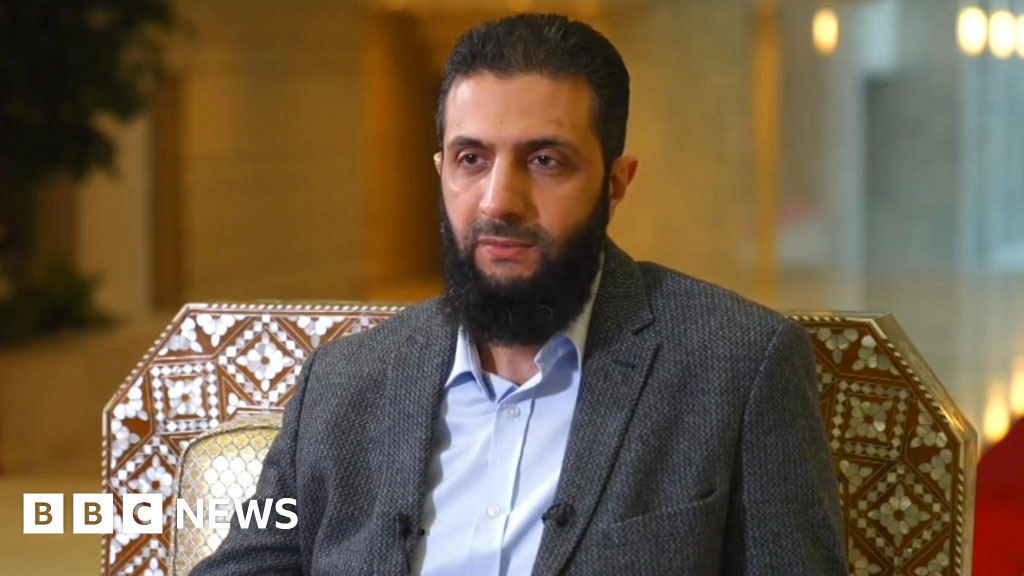
Syria not threat to world, rebel leader al-Sharaa tells BBC
The de facto leader of Syria, Ahmed al-Sharaa, has said the country is exhausted by war and is not a threat to its neighbours or to the West.
In an interview with the BBC in Damascus, he called for sanctions on Syria to be lifted.
“Now, after all that has happened, sanctions must be lifted because they were targeted at the old regime. The victim and the oppressor should not be treated in the same way,” he said.
Sharaa led the lightning offensive that toppled Bashar al-Assad’s regime less than two weeks ago. He is the leader of the Hayat Tahrir al-Sham (HTS), the dominant group in the rebel alliance, and was previously known by his nom de guerre of Abu Mohammed al-Jolani.
He said HTS should be de-listed as a terrorist organisation. It is designated as one by the UN, US, EU and UK, among many others, as it started as a splinter group of al-Qaeda, which it broke away from in 2016.
Sharaa said HTS was not a terrorist group.
They did not target civilians or civilian areas, he said. In fact, they considered themselves to be victim of the crimes of the Assad regime.
He denied that he wanted to turn Syria into a version of Afghanistan.
READ ALSO:
- Tinubu’s 2025 budget will increase poverty, worsen economy – PDP
- Real Madrid outclass Pachuca to win FIFA Intercontinental Cup
- Israel hits ports, energy sites in Yemen after missile intercepted
Sharaa said the countries were very different, with different traditions. Afghanistan was a tribal society. In Syria, he said, there was a different mindset.
He said he believed in education for women.
“We’ve had universities in Idlib for more than eight years,” Sharaa said, referring to Syria’s north-western province that has been held by rebels since 2011.
“I think the percentage of women in universities is more than 60%.”
And when asked whether the consumption of alcohol would be allowed, Sharaa said: “There are many things I just don’t have the right to talk about because they are legal issues.”
He added that there would be a “Syrian committee of legal experts to write a constitution. They will decide. And any ruler or president will have to follow the law”.
Sharaa was relaxed throughout the interview, wearing civilian clothes, and tried to offer reassurance to all those who believe his group has not broken with its extremist past.
Many Syrians do not believe him.
The actions of Syria’s new rulers in the next few months will indicate the kind of country they want Syria to be – and the way they want to rule it.
Syria not threat to world, rebel leader al-Sharaa tells BBC
BBC
International
Israel hits ports, energy sites in Yemen after missile intercepted
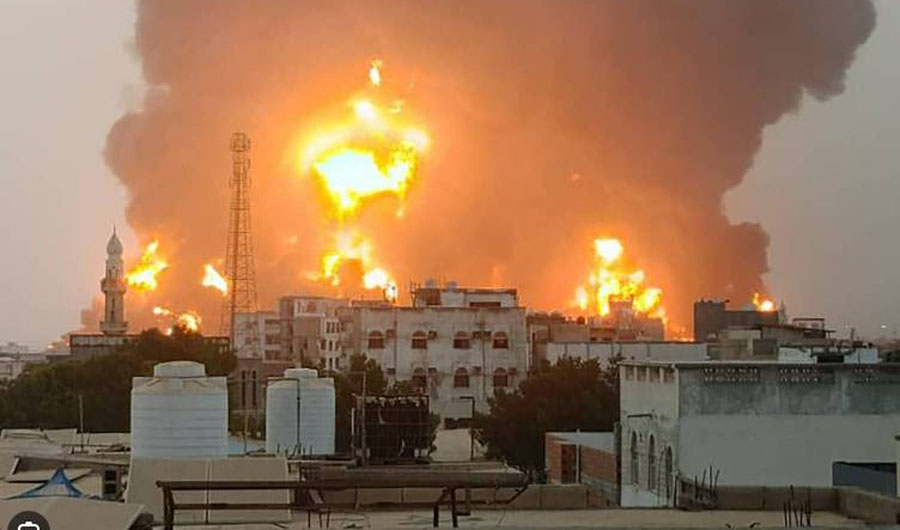
Israel hits ports, energy sites in Yemen after missile intercepted
JERUSALEM: Israel said Thursday it struck ports and energy infrastructure it alleges are used by Houthi militants, after intercepting a missile fired by the group.
Israel’s military said it “conducted precise strikes on Houthi military targets in Yemen — including ports and energy infrastructure in Sanaa, which the Houthis have been using in ways that effectively contributed to their military actions.”
The announcement came shortly after Israel said it had intercepted a missile fired from Yemen.
Al-Masira, a media channel belonging to the Houthis, said a series of “aggressive raids” were launched in the Yemeni capital of Sanaa and the port city of Hodeidah.
It reported raids that “targeted two central power plants” in Yemen’s capital Sanaa, while in Hodeidah it said “the enemy launched four aggressive raids targeting the port… and two raids targeting” an oil facility.
The strikes were the second time this week that Israel’s military has intercepted a missile from Yemen.
On Monday, the Houthis claimed a missile launch they said was aimed at “a military target of the Israeli enemy in the occupied area of Yaffa” — a reference to Israel’s Tel Aviv area.
READ ALSO:
- Gaza mediators intensify ceasefire efforts, Israeli strikes kill 20 people
- PDP expels South-East national vice chairperson over anti-party activities
- Your information on $1bn investment misleading, Dangote Refinery replies NNPCL
Also Monday, an Israeli navy missile boat intercepted a drone in the Mediterranean after it was launched from Yemen, the military said.
The Houthi militants have said they are acting in solidarity with Palestinians and pledged Monday to continue operations “until the aggression on Gaza stops and the siege is lifted.”
On December 9, a drone claimed by Houthis exploded on the top floor of a residential building in the central Israel city of Yavne, causing no casualties.
In July, a Houthi drone attack in Tel Aviv killed an Israeli civilian, prompting retaliatory strikes on the Yemeni port of Hodeidah.
The Houthis have also regularly targeted shipping in the Red Sea and the Gulf of Aden, leading to retaliatory strikes on Houthi targets by United States and sometimes British forces.
Israeli military spokesman Daniel Hagari said the group had become a “global threat,” pointing to Iran’s support for the militants.
“We will continue to act against anyone, anyone in the Middle East, that threatens the state of Israel,” he said.
Israel hits ports, energy sites in Yemen after missile intercepted
International
Gaza mediators intensify ceasefire efforts, Israeli strikes kill 20 people
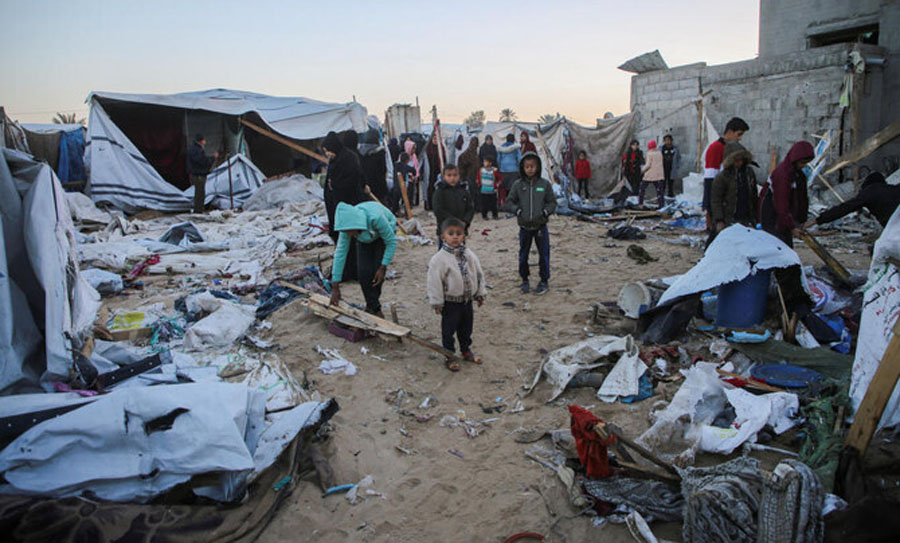
Gaza mediators intensify ceasefire efforts, Israeli strikes kill 20 people
CAIRO: The United States, joined by Arab mediators, sought on Wednesday to conclude an agreement between Israel and Hamas to halt the 14-month-old war in the Gaza Strip where medics said Israeli strikes killed at least 20 Palestinians overnight.
A Palestinian official close to the negotiations said on Wednesday that mediators had narrowed gaps on most of the agreement’s clauses. He said Israel had introduced conditions which Hamas rejected but would not elaborate.
On Tuesday, sources close to the talks in Cairo, the Egyptian capital, said an agreement could be signed in coming days on a ceasefire and a release of hostages held in Gaza in return for Palestinian prisoners held by Israel.
Medics said an Israeli airstrike killed at least 10 people in a house in the northern town of Beit Lahiya while six were killed in separate airstrikes in Gaza City, Nuseirat camp in central areas, and Rafah near the border with Egypt.
In Beit Hanoun in the northern Gaza Strip, medics said four people were killed in an airstrike on a house. There was no immediate comment from the Israeli military spokesman.
Israeli forces have operated in the towns of Beit Hanoun and Beit Lahiya as well as the nearby Jabalia camp since October, in a campaign the military said aimed to prevent Hamas militants from regrouping.
Palestinians accuse Israel of carrying out acts of “ethnic cleansing” to depopulate the northern edge of the enclave to create a buffer zone. Israel denies it.
READ ALSO:
- PDP expels South-East national vice chairperson over anti-party activities
- Your information on $1bn investment misleading, Dangote Refinery replies NNPCL
- Many die at Ibadan children’s Christmas party stampede, organisers arrested
Hamas does not disclose its casualties, and the Palestinian health ministry does not distinguish in its daily death toll between combatants and non-combatants.
On Wednesday, the Israeli military said it struck a number of Hamas militants planning an imminent attack against Israeli forces operating in Jabalia.
Later on Wednesday, Muhammad Saleh, director of Al-Awda Hospital in Jabalia, said Israeli shelling in the vicinity damaged the facility, wounding seven medics and one patient inside the hospital.
The Israeli military had no immediate comment.
In the Central Gaza camp of Bureij, Palestinian families began leaving some districts after the army posted new evacuation orders on X and in written and audio messages to mobile phones of some of the population there, citing new firing of rockets by Palestinian militants from the area.
CEASEFIRE GAINS MOMENTUM
The US administration, joined by mediators from Egypt and Qatar, has made intensive efforts in recent days to advance the talks before President Joe Biden leaves office next month.
In Jerusalem, Israeli President Isaac Herzog met Adam Boehler, US President-elect Donald Trump’s designated envoy for hostage affairs. Trump has threatened that “all hell is going to break out” if Hamas does not release its hostages by Jan. 20, the day Trump returns to the White House.
CIA Director William Burns was due in Doha on Wednesday for talks with Qatari Prime Minister Sheikh Mohammed bin Abdulrahman Al-Thani on bridging remaining gaps between Israel and Hamas, other knowledgeable sources said. The CIA declined to comment.
Israeli negotiators were in Doha on Monday looking to bridge gaps between Israel and Hamas on a deal Biden outlined in May.
There have been repeated rounds of talks over the past year, all of which have failed, with Israel insisting on retaining a military presence in Gaza and Hamas refusing to release hostages until the troops pulled out.
The war in Gaza, triggered by a Hamas-led attack on communities in southern Israel that killed some 1,200 people and saw more than 250 abducted as hostages, has sent shockwaves across the Middle East and left Israel isolated internationally.
Israel’s campaign has killed more than 45,000 Palestinians, displaced most of the 2.3 million population and reduced much of the coastal enclave to ruins.
Gaza mediators intensify ceasefire efforts, Israeli strikes kill 20 people
ARAB NEWS
-

 Railway1 day ago
Railway1 day agoLagos Rail Mass Transit part of FG free train ride – NRC
-

 metro11 hours ago
metro11 hours agoWhy we displayed ‘Jesus Christ is not God’ banner at Lekki mosque -Imam
-

 metro2 days ago
metro2 days agoCourt stops customs from seizing imported rice in open market
-

 metro3 days ago
metro3 days agoIbadan stampede: Tinubu orders probe as death toll hits 40
-

 metro2 days ago
metro2 days agoIbadan stampede: Ooni reacts after arrest of ex-wife
-

 metro1 day ago
metro1 day agoNIMC warns against extortion, reaffirms free NIN enrollment
-

 metro2 days ago
metro2 days agoAfe Babalola: Court grants Dele Farotimi bail, barred from media interviews
-

 News3 days ago
News3 days agoAdebayo Ogunlesi, 2 other Nigerians make Forbes 50 wealthiest Black Americans list 2024

